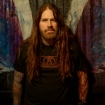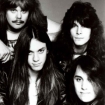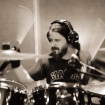Forbidden made their mark on the world of thrash just as you would expect — hard and fast. The band came roaring out of the gate in 1988 with their seminal Combat debut, Forbidden Evil, and followed it up two years later with the equally fierce, if also more techy and varied, Twisted Into Form. And while they've experienced starts and stops since (their most recent full-length was 2010's Omega Wave) Forbidden's first two albums remain primal slices of second-wave Bay Area thrash, on par with peers like Testament and Death Angel, and worthy successors to the early works of pioneers like Metallica and Exodus.
Revolver recently spoke with Forbidden drummer Paul Bostaph, who manned the kit on Forbidden Evil and Twisted Into Form — before going on to play with Slayer, Exodus and Testament, among others. In addition to reminiscing about his time in the band, Bostaph also offered up plenty of behind-the-scenes stories and anecdotes about Forbidden's earliest days, as well as some of the hijinks that occurred around the making of both albums. With that in mind, here's six things you probably didn't know about Forbidden.
1. When Forbidden formed, most of the band was still in high school — including future Machine Head bandleader Robb Flynn
"I joined Forbidden when I was about 20," Bostaph recalls, a fact that made him something of the band's elder statesman considering that most of his bandmates — including founding guitarist Robb Flynn (who co-wrote Forbidden Evil's title-track, "Chalice of Blood" and "As Good As Dead," but left before its recording to join Vio-lence), guitarist Craig Locicero and original bassist John Tegio — weren't even out of high school.
"They were all either sophomores or juniors or seniors in high school," says Bostaph. "Later on, Robb wrote a song about his high school, which was in Fremont, California ["American High," from Machine Head's 2001 album, Supercharger]. I was older, and I was the only one working a full-time job. I was also the only guy with a driver's license. So after I got off work I'd have to pick everybody up and take them to band practice." He laughs. "Another full-time job!"
2. Paul Bostaph was originally Forbidden's driver — before he replaced his cousin on drums
While Bostaph would ultimately play on Forbidden's 1988 debut, Forbidden Evil, and follow-up, Twisted Into Form, he wasn't the band's first choice of drummers. That distinction goes to Jim Pittman, who, incidentally, was Bostaph's cousin.
"My cousin, Jim Pittman … started the band with Robb Flynn when they were in high school. They would go jam at lunchtime — I think "Chalice of Blood" was actually written during lunch, which is pretty outstanding. They started playing some gigs at places like [Berkeley club] Ruthie's Inn, but my cousin didn't have any way to get his drums to the venues. So I was like, 'Dude, I'll help you.' Because I had a van to haul my own drums." When Forbidden decided it was time to part ways with Pittman, they approached Bostaph with an offer — but the drummer had some reservations.
"The first time I said no, because Jim was my cousin," he says. "But then it was clear that he just wasn't the right fit with the guys. They asked me again and I thought they were a really good band so I said yes. It put a strain on my relationship with my cousin for a little while, but we're good now. And the rest is kind of history."
3. Before releasing their debut album, the band changed their name from Forbidden Evil to Forbidden.
The idea for the name change came from Forbidden's then-manager. "And I think the label felt that to change the name opened up the possibility of the band being more widely accepted," Bostaph says. "Because there are connotations — with Forbidden Evil, you're 'this' type of thing, and people who don't know who you are only going to hear you as that. So Forbidden was just a little easier.
"Conceptually, it bothered us a little bit at first," he continues. "But then when we wrapped our heads around it we were like, 'Okay, Forbidden's not bad either…' And then we called the album Forbidden Evil because we wanted to pay tribute to what we once were."
4. John Cuniberti was not the right producer for Forbidden Evil
Forbidden Evil was tracked at Alpha & Omega Recording in San Francisco, with John Cuniberti and Doug Caldwell at the helm. Cuniberti had previously produced a pair of Joe Satriani albums, including the guitarist's 1987 mainstream breakthrough, Surfing With the Alien. Despite that recent success — or maybe because of it — Bostaph didn't find the experience with Cuniberti to be a positive one.
"One of my memories of those sessions is that after we'd finish a take, John would listen back and he'd go, 'Well, it's good enough for Combat,' " Bostaph recalls. "He was looking down his nose at us. I'm not criticizing how he is as a producer, I just think he was the wrong person for that record. And we would argue. But here's a guy who was producing Joe Satriani records, and this is my first professional studio session, so most of those arguments I think I just completely lost." Bostaph laughs. "I remember I had once heard a story about Lemmy [Kilmister] smashing a cheeseburger into a console. I wish I had smashed a cheeseburger in John's console a few times!"
5. Forbidden's inter-band criticism almost derailed Twisted Into Form entirely
Many people have characterized Forbidden's second album as having a more progressive edge than their debut, which Bostaph says he finds "funny," because "Craig [Locicero] started coming to rehearsal and he would show me some riffs he had and I would say, 'Man, that just sounds like something else. It doesn't sound like us — it's too progressive.' And Craig would get kinda bummed. So Twisted Into Form almost didn't happen, because Craig almost quit because I was so judgmental of what he was writing."
But, Bostaph continues, "Eventually Craig and I had a really good conversation about it. He goes, 'Dude, I spent hours writing this stuff and you keep shooting it down…' But I tried to explain that I wanted us to be more than just what people expected us to be. Something different. It was a hard moment for both of us, but I had to learn to back off a little bit. And to be honest, I didn't. I was kind of a dick when it came to songwriting and Craig had to learn to deal with me being a dick. But we figured out how to work together."
6. When sessions for Twisted Into Form finally did get underway, it was with the aid of lots of weed — which also nearly ground the recording to a halt
"Most of Twisted was actually written without me playing drums," Bostaph says. "We'd get into the studio, and Tim [Calvert] and Craig would get their guitars out and start working on riffs. And when they'd come up with a riff I liked we'd put it together with another riff and then we'd arrange it. But we got to this point where we'd start smoking and then nothing would happen. We'd be there for two or three hours and … nothing. Finally we said, 'We have to stop, because this is counterproductive.'"
Forbidden eventually found an effective working style — albeit near the album's completion. "Toward the end of that record, we were working on the song 'Tossed Away,' and I remember Craig saying the verse riff was too simple," Bostaph recalls. "But I was like, 'No, dude, it's heavy. Check it out!' So he played the riff and I sat down at the drums and we wrote the whole song. When we were done I was like, 'That was easy!' This was probably seven songs in — I should have just been playing drums the whole time we were working on the record!"












